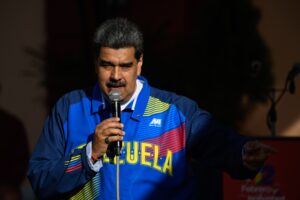Following national elections on Sunday, civil unrest and violence has broken out in the streets of some of Venezuela’s most populous cities and towns.
The Venezuelan political opposition is responding to the country’s electoral council certifying the victory of incumbent President Nicolas Maduro, who won 51% of the vote – enough to secure an outright victory.
Indeed, the Venezuelan Conflict Observatory, a politically independent NGO, claims to have registered 187 protests in 20 states. Eleven people are thought to have died during the protests thus far.
International media has reported that a bus carrying international election observers was attacked by masked anti-government activists while making its way to Caracas airport on Monday.
One of the observers described the situation amid the chaos, saying that ‘the bus managed to turn back and hopefully will make its way back to the hotel where we are staying’.
Footage of Caracas by the BBC shows highways blocked by burning tires and national police attempting to disperse crowds. Rocks and Molotov cocktails are also said to have been thrown at the police.
The New York Times has reported the presence of ‘large groups of young men’ walking down main roads, tearing down campaign posters, and chanting anti-government slogans.
In Cumaná, a city not far from Caracas, protestors are said to have attempted to enter the headquarters of Venezuela’s National Electoral Council, while ‘acts of vandalism’ on state infrastructure are now being investigated by the authorities.
Venezuela’s authorities claim that a total of 749 protestors have been arrested to-date on an array of charges, including arson, destruction of property, and even terrorism.
In response to the instability, the Organization of American States (OAS) has announced that it will meet to help chart a course forward for Venezuela. The OAS wants reconciliation to be privileged above civil disobedience.
Regional leaders such as Brazilian President Luiz Inácio Lula da Silva had praised the ‘peaceful nature’ of Sunday’ election but Brazil has since called for peace in the face of mounting unrest.
The Maduro government will therefore be working with members of the international community to cool the situation before considering the others challenges, not least economic, that Venezuela faces.
Read more:
Civil unrest in Venezuela as opposition disputes election results















